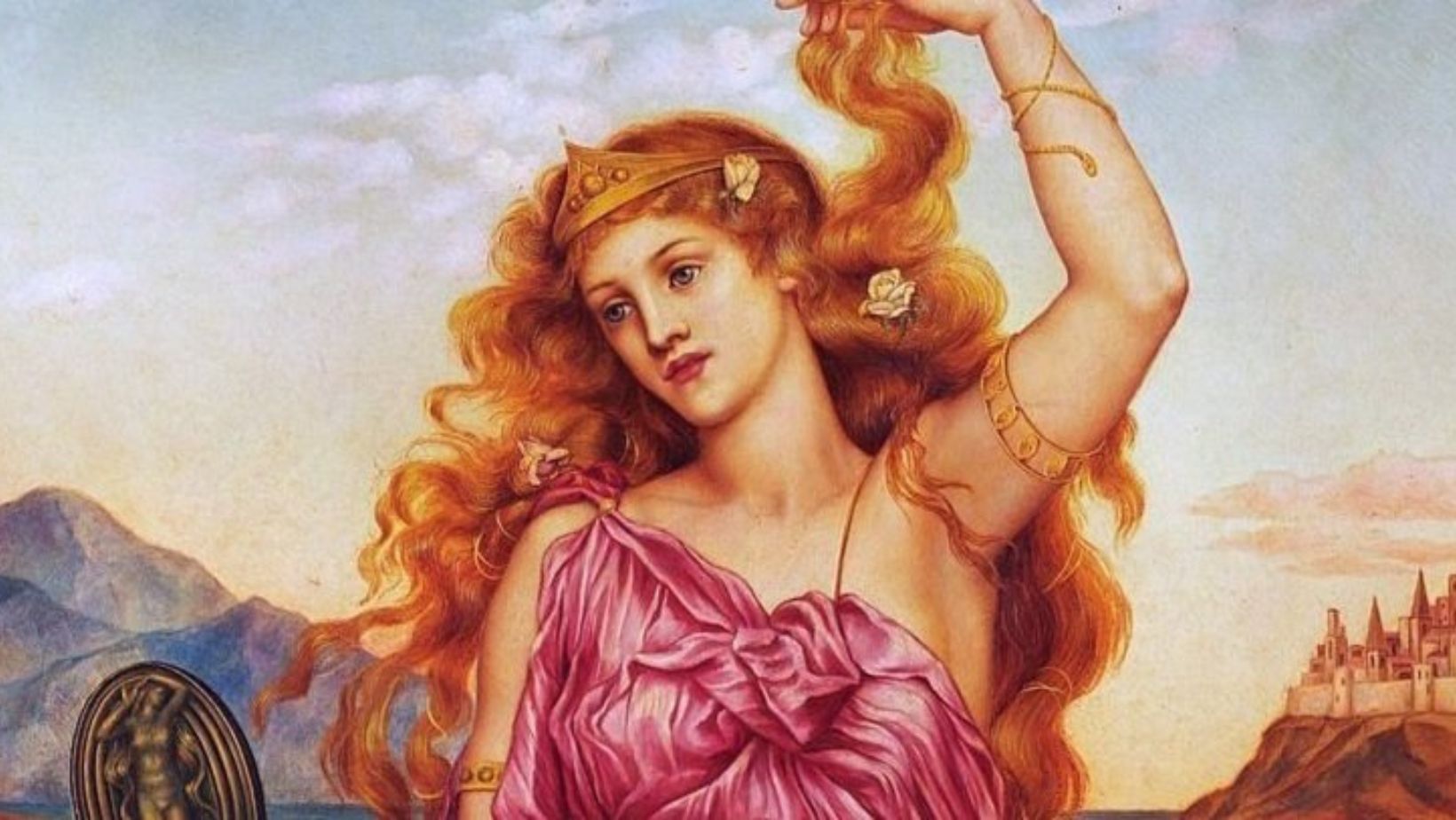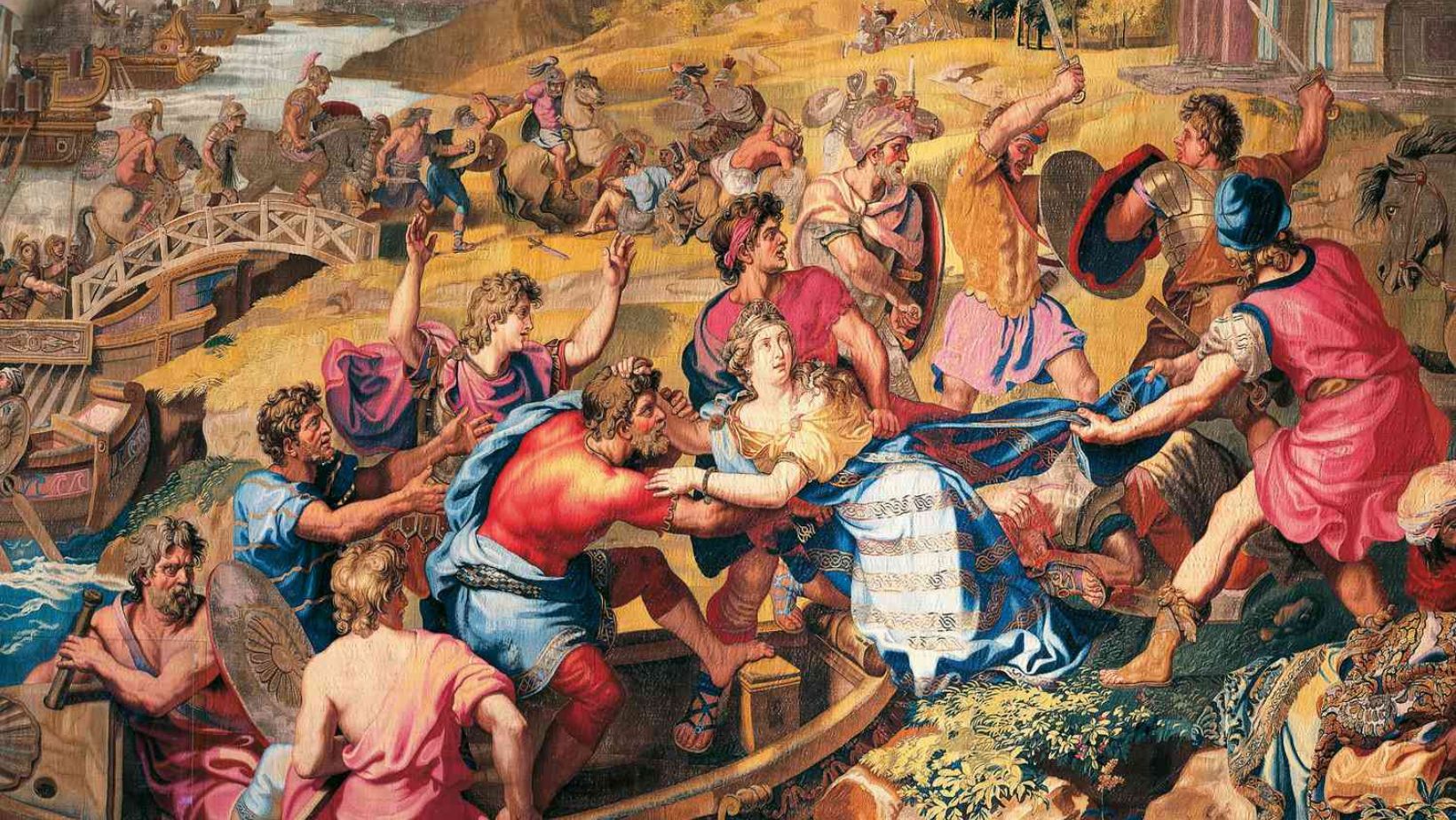Helen of Troy and Spartan History – the face that launched a thousand ships. But who was this enigmatic beauty, and what role did she play in the rich tapestry of Spartan history?
As we peel back the layers of myth and legend, we find a woman whose allure and influence echoed through the ages. From her divine origins to her infamous abduction, Helen’s story is one of love, war, and destiny.
So, let’s embark on a journey through time, as we unravel the captivating tale of Helen of Troy and her indelible mark on the ancient world.
Table of Contents:
- Who Was Helen of Troy?
- The Trojan War and Helen’s Role
- Helen in Greek Mythology and Literature
- The Historical Basis for Helen and the Trojan War
- Helen’s Divine Origins and Cult Worship
Who Was Helen of Troy?

Helen of Troy and Spartan History, also known as Helen of Sparta, was a legendary figure in Greek mythology known for her extraordinary beauty. She was called “the face that launched a thousand ships” because her abduction by Paris, the handsome Trojan prince, sparked the Trojan War.
But who was this Helen, this beautiful woman who caused one of the most famous conflicts in ancient history? Let’s take a closer look at her story.
Helen’s Early Life, Marriage to Menelaus, Abduction by Paris: Helen of Troy and Spartan History
Helen was born in Sparta, the daughter of Zeus and Leda. From a young age, her great beauty was renowned. When it came time for this young girl to marry, suitors came from far and wide to seek her hand.
She eventually chose Menelaus, the king of Sparta. They had a daughter together named Hermione and seemed to have a happy marriage – until Paris entered the picture.
Paris, the handsome Trojan prince, was promised the most beautiful woman in the world by Aphrodite. He came to Sparta and, with Aphrodite’s help, either abducted or eloped with Helen, taking her back to Troy. This event sparked the legendary Trojan War.
Imagine the fury of Menelaus, the powerful Spartan king, when he discovered his wife was taken by this Trojan prince. He called upon his brother Agamemnon and other Greek kings to raise an army to get Helen back. And so began a war that would be remembered for centuries.
The Trojan War and Helen’s Role: Helen of Troy and Spartan History
The Trojan War is one of the most famous stories in Greek mythology. It was a long, bloody conflict between the Greeks and the Trojans, all started by one woman—Helen of Troy.
The Judgement of Paris, Sparking the Trojan War, Helen’s Fate After the War
The seeds of the Trojan War were sown at the wedding of Peleus and Thetis. Eris, the goddess of discord, threw a golden apple inscribed “to the fairest” among the guests. Three goddesses claimed it – Hera, Athena, and Aphrodite. They asked Paris, the handsome Trojan prince, to judge who should get the apple.
Each goddess offered Paris a bribe. Hera offered power, Athena offered wisdom, but Aphrodite offered the love of the most beautiful woman in the world—Helen. Paris chose Aphrodite, thus sealing Troy’s fate.
Paris traveled to Sparta, where Helen was queen, and either abducted or eloped with her, taking her back to Troy. This sparked the Trojan War, as Menelaus, Helen’s husband, rallied the Greek kings and armies to get her back.
The war raged for ten years, as chronicled in Homer’s epic poem, the Iliad. The Greeks finally infiltrated Troy using the famous Trojan Horse and sacked the city. But what happened to Helen?
In some versions, Menelaus was initially intent on killing his unfaithful wife. But when he saw her again, her beauty overwhelmed his anger. They returned to Sparta, where they lived out their days as king and queen. In other tellings, Helen and Menelaus were made immortal by Zeus and welcomed into Elysium after death.
So ended the tale of the Trojan War, a conflict that cost countless lives – all over one woman, the beautiful Helen of Troy. But her story lived on, immortalized in myth, art, and literature for centuries to come.
Helen in Greek Mythology and Literature: Helen of Troy and Spartan History
Helen of Troy and Spartan History has been a captivating figure in Greek mythology and literature for thousands of years. Her story has been told and retold, embellished and reinterpreted, inspiring countless works of art.
Homer’s Iliad, Other Ancient Sources, Later Depictions in Art and Literature: Helen of Troy and Spartan History
The most famous ancient work featuring Helen is Homer’s Iliad, an epic poem recounting the Trojan War. In it, Helen is portrayed as a complex figure who regrets the war she helped cause. Her beauty is constantly referenced, seen as both a blessing and a curse.
But the Iliad wasn’t the only ancient text to feature Helen. The poet Stesichorus wrote a work claiming that Helen never actually went to Troy – it was just an illusion of her while she was spirited away to Egypt. The historian Herodotus repeated this version.
In the 5th century BCE, the playwright Euripides wrote his play Helen, which also used the version of the story where she remained in Egypt during the Trojan War. His play The Trojan Women also featured Helen, defending her actions.
Helen’s story continued to inspire writers long after ancient times. She appears in medieval works like Chaucer’s Troilus and Criseyde and Shakespeare’s Troilus and Cressida. In the Renaissance, Christopher Marlowe had his famous version of the Faust legend summon Helen in Doctor Faustus, resulting in the memorable line:
Was this the face that launch’d a thousand ships,
And burnt the topless towers of Ilium?
Helen has remained an enduring subject in art as well, depicted by countless painters from ancient vase decorators to the likes of Dante Gabriel Rossetti and Gustave Moreau in the 19th century. Her abduction, the Judgement of Paris, and her flight from Troy have all been popular scenes.
So Helen’s story has resonated through the centuries, continually revisited and reimagined by each new generation of artists and writers. Her complex tale of love, beauty, and war has proven timelessly compelling, ensuring her an immortal place in our cultural memory.
The Historical Basis for Helen and the Trojan War

While Helen of Troy and the Trojan War are steeped in myth and legend, scholars have long debated whether there might be some historical truth behind the tales. Was there a real Trojan War? A real Helen who sparked a great conflict between Greeks and Trojans?
Archaeological Evidence, Theories on the Reality of Troy and the War
The ancient city of Troy did exist; that much is certain. Archaeologists have uncovered the remains of a great city in modern-day Turkey that fits Homer’s description. The site, known as Hisarlik, had multiple layers, indicating it was destroyed and rebuilt several times.
The layer known as Troy VI or VIIa, dating to around 1300-1190 BCE, shows signs of destruction by war. This has led many to believe that it could be the Troy of legend and that there may have been a real Trojan War that inspired Homer’s epic.
However, the war likely differed greatly from the one in the myths. It may have been a conflict over trade and territory, with the Greeks (or Mycenaeans) seeking to expand their influence. Of course, the involvement of gods and goddesses was poetic embellishment.
There is no concrete evidence that Helen was a real historical figure. However, the ancient Greeks certainly believed she was real and even worshipped her as a goddess in some places.
So, while the Trojan War may have had some basis in historical fact, the story of Helen and the epic conflict fought over her was likely a mythical elaboration on a more mundane reality. But myth or history, her story has endured as one of the most captivating tales of the ancient world.
Helen’s Divine Origins and Cult Worship: Helen of Troy and Spartan History
Helen of Troy and Spartan History wasn’t just a mortal woman in Greek mythology. She was said to have divine origins and was even worshipped as a goddess in some parts of the Greek world.
Daughter of Zeus and Leda, The Divine Twins, Worship of Helen in Sparta
According to myth, Helen was the daughter of Zeus, the king of the gods, and Leda, the queen of Sparta. Zeus had taken the form of a swan to seduce Leda, and Helen resulted from their union.
This divine parentage explained Helen’s extraordinary beauty. No mere mortal could be so lovely—she had to be the daughter of a god.
Helen’s siblings were divine as well. Her brothers were the famous twins Castor and Pollux, known as the Dioscuri. They were worshipped as gods, associated with horsemanship and often invoked by sailors in distress.
But Helen was worshipped in her own right, particularly in Sparta. She had a temple there, and young girls would offer sacrifices to her before marriage, hoping to be granted a fraction of her beauty and allure.
This cult of Helen treated her as a goddess of beauty and love, similar to Aphrodite. She was also seen as a protector of maidens and a patron of marriage.
So, while the Homeric epics portrayed Helen as a human woman, albeit an exceptionally beautiful one, she also had a divine aspect. To the ancient Greeks, her loveliness was so great that it could only be the product of divinity. In worshipping her, they hoped to partake in just a small part of her godly grace and charm.
Key Takeaway: Helen of Troy and Spartan History
Helen of Troy, born in Sparta to Zeus and Leda, was renowned for her beauty. Her abduction by Paris sparked the Trojan War. Despite being a mortal queen, she had divine origins and was worshipped as a goddess in some parts of Greece.
Conclusion: Helen of Troy and Spartan History
Helen of Troy’s legacy endures as a testament to the power of beauty, love, and the indomitable spirit of the ancient world. Her story, woven into the fabric of Spartan history, continues to captivate and inspire us today.
From her divine birth to her role in the epic Trojan War, Helen’s tale is mythic. Yet, beneath the layers of legend, we find a woman whose choices and actions had far-reaching consequences for the world around her.
In exploring the life and times of Helen of Troy, we gain a deeper appreciation for the rich tapestry of ancient history and the enduring impact of one remarkable woman.

